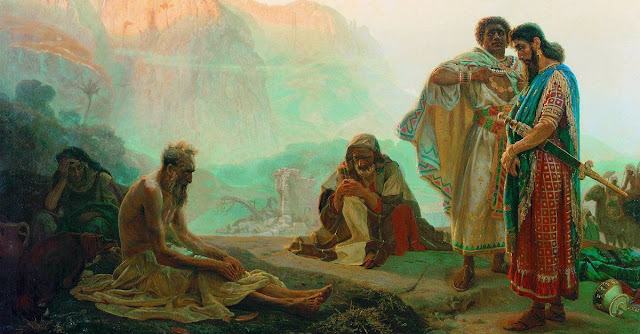We do not know the author of this intriguing
book, nor do we know when it was written or when its events occurred but there
are a few clues in its text that lead us to believe that it takes place during
or before the days of Abraham, making this book the oldest text in the Bible.
This is not a historical narrative; it is a book of poetry grouped alongside the works of Solomon as one of the wisdom books. In its 42 chapters you will find clever poetry to put Shakespeare to shame (When the Almighty was yet with me, [And] my children were around me; When my steps were bathed in butter, And the rock poured out for me streams of oil! - Job 29:5-6 NASB) and maybe you will find some perspective when faced with your own problems.
In the opening two chapter introduction we see a debate between God and Satan concerning the faith of Job, a debate that Job is never privy to, and in this debate we find a clue to understanding the last two chapters of the book. You see, Job is an honorable, faithful man blessed by God to the point that Satan has taken notice of him and even God calls him the finest man in all the earth.
Then the LORD asked Satan, "Have you noticed my servant Job? He is the finest man in all the earth. He is blameless--a man of complete integrity. He fears God and stays away from evil." - Job 1:8 NLT
Satan, naturally, takes opposition to this statement and accuses God of buying Job’s loyalty with blessings (health, wealth, family, etc.). God allows Satan to test the faith of Job by removing all the blessings God has given him (health, wealth, family, etc.). Job’s grief was so great he sat in a pile of ashes without speaking for a whole week, but remember this book is not about suffering.
The next thirty-eight chapters contains a debate between Job and his friends regarding the reason for Job’s suffering in particular and human suffering in general with regards to God’s justice.
Job believes God is just but he also asserts his innocence and concludes that either God does not run the world with justice or that God Himself is somehow unjust. But he finds both these options unsatisfying and he is not so much drawing conclusions as he is searching for answers. He rejects the conclusions his friends offer also and appeals to God for an answer, wishing he had a mediator to plead his case before God.
The debate rages from chapter 3 to chapter 40 where God shows up to settle the matter. The Lord’s presence does not bring answers, but it does bring comfort and humility to Job. Job has been asking why has he been suffering in innocence and God decides to take him on a tour of the universe revealing just how limited Job’s perspective is while God balances not just one life but an entire universe with justice and there is no guarantee of blessing or cursing in this life regardless of moral character.
As we come to the end of the book, remember the heavenly debate back in the beginning. Job is being given a choice, he can choose to curse God and die, to abandon his God who, from a human perspective, has abandoned him or he can choose to trust God despite the circumstances. Satan wants to shift people like wheat, to pull them away from God be it with worldly possessions, or worldly suffering. God calls His people to trust Him, regardless of circumstance, in both blessing and suffering, in the garden and in the valley of the shadow of death.
In your suffering Job offers you the chance to trust God in your grief.
This book is almost a smaller version of a major theme in the Biblical narrative. Will you trust God or abandon God? The question was posed to Adam in the garden, Noah at the ark, to Moses in Egypt, to David in exile, to Jesus at the cross and to you today.


Comments
Post a Comment